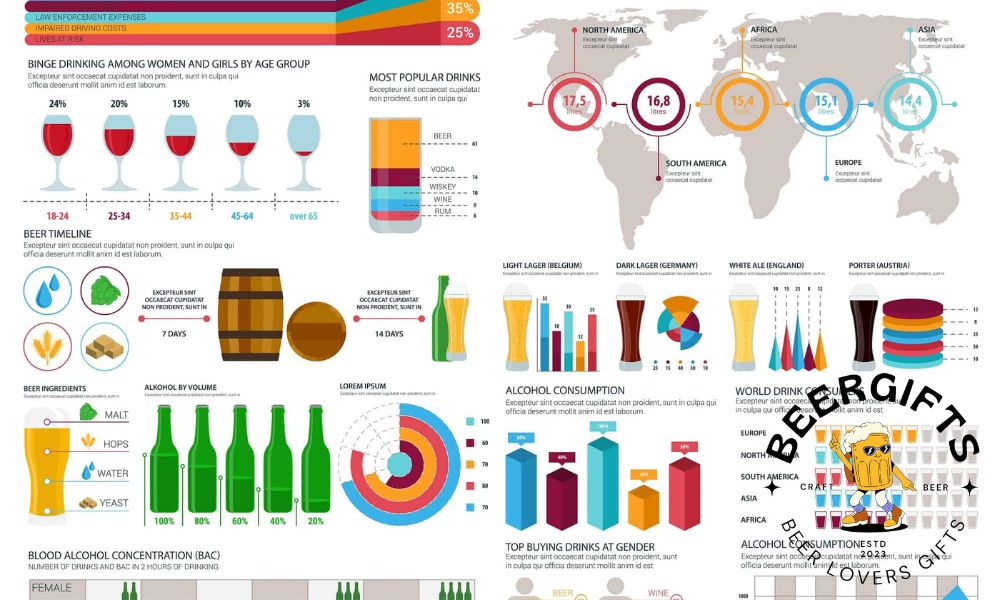Uncover the mysterious ways your body handles alcohol with this informative breakdown – you may be surprised by the results!
Table of Contents
Have you ever wondered how many beers it takes to get drunk? It’s a question that doesn’t have a simple answer. The amount of alcohol needed to reach a state of intoxication varies from person to person, influenced by a multitude of factors. In this blog post, we’ll delve into the science behind alcohol metabolism, discuss individual tolerance levels, and explore various factors that can impact how much alcohol it takes for you to feel the effects.
The Science of Alcohol Metabolism
When you take a sip of that cold beer, alcohol enters your bloodstream and starts its journey through your body. Alcohol is primarily metabolized in the liver, where enzymes break it down into byproducts that are eventually eliminated from your system. However, the rate at which your body metabolizes alcohol can be influenced by several factors.
One key factor is body weight. Generally speaking, the more you weigh, the more water your body contains, which can help dilute alcohol and slow down its absorption. Additionally, individuals with a higher metabolic rate may process alcohol more quickly than those with a slower metabolism. Liver function also plays a crucial role in alcohol metabolism, as a healthy liver can more efficiently break down alcohol compared to a liver that is compromised due to conditions like liver disease.
Individual Tolerance Levels
Alcohol tolerance refers to the amount of alcohol a person can consume before feeling its effects. Tolerance levels can vary greatly from one individual to another and are influenced by a variety of factors.
Genetics play a significant role in determining alcohol tolerance. Some people may have genetic variations that make them more or less sensitive to alcohol’s effects. Additionally, a person’s drinking history can impact their tolerance level. Regular drinkers may develop a higher tolerance over time, requiring more alcohol to achieve the same level of intoxication.
Other factors that can affect alcohol tolerance include overall health and hydration levels. Chronic health conditions or medications that impact liver function can lower a person’s tolerance to alcohol. Dehydration can also worsen the effects of alcohol, as it can accelerate the rate at which alcohol is absorbed into the bloodstream.
Other Factors Influencing Intoxication
Aside from individual factors, there are external influences that can affect how alcohol impacts your body. One such factor is food intake. Eating a meal before or while drinking can help slow down the absorption of alcohol, potentially delaying the onset of intoxication. It’s essential to remember that drinking on an empty stomach can lead to alcohol being absorbed more quickly, which may result in feeling drunk faster.

Image courtesy of www.beergifts.org via Google Images
Hydration is another critical factor that can influence intoxication levels. Drinking water between alcoholic beverages can help dilute alcohol in your system and prevent dehydration, which can exacerbate the effects of alcohol. Additionally, mixing alcohol with other substances, such as medications or illicit drugs, can have dangerous and unpredictable effects on your body, potentially leading to increased intoxication levels.
Conclusion
While the question of how many beers it takes to get drunk may not have a straightforward answer, understanding the factors that influence alcohol tolerance and intoxication can help you make more informed decisions when it comes to drinking. It’s important to know your limits, drink responsibly, and prioritize your health and well-being above all else. By being mindful of the science behind alcohol metabolism and the various factors at play, you can better navigate the world of drinking and enjoy it safely and responsibly.
FAQ
Question 1: How can I increase my alcohol tolerance?
Answer 1: Building alcohol tolerance is not recommended as it can lead to health risks and dependency. Focus on drinking in moderation and staying hydrated to maintain a healthy relationship with alcohol.
Question 2: Why do some people get drunk faster than others?
Answer 2: Factors like genetics, body weight, metabolism, and overall health play a role in how quickly alcohol is metabolized in the body, leading to variations in intoxication rates.
Question 3: Is it safe to mix alcohol with medications?
Answer 3: Mixing alcohol with medications can have dangerous interactions and should be avoided. Consult with a healthcare professional to understand how alcohol may interact with your specific medications.
Question 4: How does food affect alcohol absorption?
Answer 4: Eating food before or while drinking can slow down alcohol absorption, delaying intoxication. Drinking on an empty stomach can lead to quicker alcohol absorption and a faster onset of drunkenness. It’s essential to consume food while drinking to moderate alcohol’s effects.
Generated by Texta.ai Blog Automation


Leave a Reply